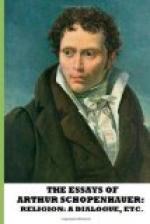Judaism had presented the Creator as separated from the world, which he produced out of nothing. Christianity identifies this Creator with the Saviour, and through him, with humanity: he stands as their representative; they are redeemed in him, just as they fell in Adam, and have lain ever since in the bonds of iniquity, corruption, suffering and death. Such is the view taken by Christianity in common with Buddhism; the world can no longer be looked at in the light of Jewish optimism, which found “all things very good”: nay, in the Christian scheme, the devil is named as its Prince or Ruler ([Greek: ho archon tou kosmoutoutou.] John 12, 33). The world is no longer an end, but a means: and the realm of everlasting joy lies beyond it and the grave. Resignation in this world and direction of all our hopes to a better, form the spirit of Christianity. The way to this end is opened by the Atonement, that is the Redemption from this world and its ways. And in the moral system, instead of the law of vengeance, there is the command to love your enemy; instead of the promise of innumerable posterity, the assurance of eternal life; instead of visiting the sins of the fathers upon the children to the third and fourth generations, the Holy Spirit governs and overshadows all.
We see, then, that the doctrines of the Old Testament are rectified and their meaning changed by those of the New, so that, in the most important and essential matters, an agreement is brought about between them and the old religions of India. Everything which is true in Christianity may also be found in Brahmanism and Buddhism. But in Hinduism and Buddhism you will look in vain for any parallel to the Jewish doctrines of “a nothing quickened into life,” or of “a world made in time,” which cannot be humble enough in its thanks and praises to Jehovah for an ephemeral existence full of misery, anguish and need.
Whoever seriously thinks that superhuman beings have ever given our race information as to the aim of its existence and that of the world, is still in his childhood. There is no other revelation than the thoughts of the wise, even though these thoughts, liable to error as is the lot of everything human, are often clothed in strange allegories and myths under the name of religion. So far, then, it is a matter of indifference whether a man lives and dies in reliance on his own or another’s thoughts; for it is never more than human thought, human opinion, which he trusts. Still, instead of trusting what their own minds tell them, men have as a rule a weakness for trusting others who pretend to supernatural sources of knowledge. And in view of the enormous intellectual inequality between man and man, it is easy to see that the thoughts of one mind might appear as in some sense a revelation to another.



